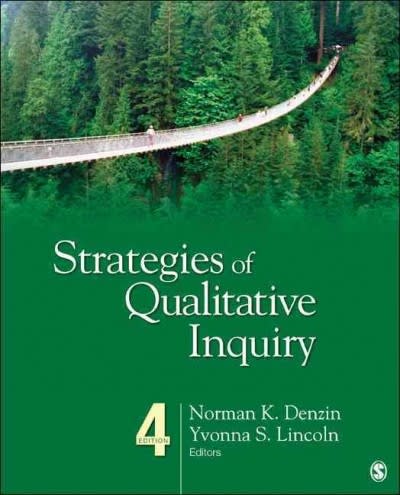Question
I need help with a conclusion and maybe expanding on the paragraphs further. According to research, temperament is something you are born with (Feldman, 2022,
I need help with a conclusion and maybe expanding on the paragraphs further.
According to research, temperament is something you are born with (Feldman, 2022, p. 185). Temperament is mostly inherited and consistent throughout a person's life (Feldman, 2022, p. 185). For example, Caspi and colleagues (2003) longitudinal study observed 1000 3-year-old children with various temperaments. Twenty-three years later, they examined most of the 1,000 children as adults. They discovered that the children's temperament at age 3 predicted adult personality characteristics (Caspi et al., 2003). This implies that temperament is a significant factor in development as a feature of nature.
Studies about genetic predisposition have demonstrated genes' crucial role in ascertaining an individual's disposition for particular characteristics or skills (Feldman, 2022, p. 67). However, contextual circumstances frequently influence how these features manifest. For instance, research conducted in 2015 by Plomin and Deary discovered that up to 50% of the variable in intelligence may be attributed to hereditary factors, with environmental factors accounting for the remaining variance (Anthony, 2018).
John Bowlby and Mary Ainsworth established attachment theory, which holds that early interaction between the caregiver or parent and the child dramatically influences a child's emotional and social development (Feldman, 2022, p.176). This idea has been validated by research demonstrating how children with stable attachments typically have higher levels of independence, self-worth, and quality relationships (Feldman, 2022, p.178).
According to Diana Baumrind's parenting style studies, children benefit most from authoritative parenting, which is defined by both firmness and warmth (Feldman, 2022, p.256). On the other hand, authoritarian and permissive parenting approaches may result in children's behavioral difficulties and low academic achievement (Feldman, 2022, p. 257).
In development, both nurture and nature are essential. The genetic blueprint for development is provided by nature, but its expression is shaped by nurture (Cherry, 2023). For instance, a kid may be genetically predisposed to high intellect, but this potential may not be fully fulfilled without a supportive learning environment. Similarly, a child with a challenging temperament (nature) may benefit from improved coping mechanisms in a nurturing and understanding setting (nurture).
According to Judith Rich Harris's research covered in Gladwell's piece, peer influencea type of nurturecan significantly impact a child's behavior more than parental influence (Gladwell, 1998). This emphasizes how crucial it is to consider various nurturing sources during growth. The two women in the podcast "Switched at Birth" had quite different experiences with identical genetic makeup, further emphasizing the intricate relationship between nature and nurture (Glass, 2008).
Step by Step Solution
There are 3 Steps involved in it
Step: 1

Get Instant Access to Expert-Tailored Solutions
See step-by-step solutions with expert insights and AI powered tools for academic success
Step: 2

Step: 3

Ace Your Homework with AI
Get the answers you need in no time with our AI-driven, step-by-step assistance
Get Started


